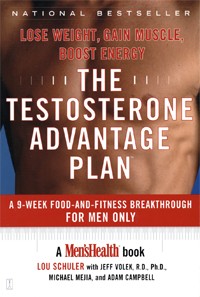The Testosterone Advantage Plan
|

|
| Author: |
Schuler L, Volek J |
| Category: |
Health/Fitness |
| Audience: |
Consumer |
| Length: |
312 pages |
| Publisher: |
Simon & Schuster |
| Year Published: |
2002 |
| List Price: |
$13.00 |
|
|
|
|
AthleteInMe.com®
Rating:



 Excellent!
Excellent!
The Testosterone Advantage Plan describes a 9-week plan that combines a diet with a weight-training program. It is intended for a male audience.
ABOUT THE AUTHORS
• Lou Schuler holds the position of Fitness Director at Men's Health magazine.
• Jeff Volek, RD, PhD, is an assistant professor at the University of Connecticut.
CONTENT
The 312-page book is arranged as follows:
PART I:
- Chapter 1: Our Burgers, Ourselves
- Chapter 2: Why Almost Everything You Know About Fitness Is Probably Dead Wrong
- Chapter 3: The Cardio Conundrum
- Chapter 4: Testosterone: A Man's Key To Getting and Staying Fit
PART II:
- Chapter 5: The Men's Health T
- Chapter 6: The Meat/Muscle Connection
- Chapter 7: The Manly Fats
- Chapter 8: Carbohydrate Revisited
- Chapter 9: Putting Together the Food Plan
- Chapter 10: When You Eat, And Why It Matters
- Chapter 11: The 1-Week Meal Planner
PART III:
- Chapter 12: Introduction to the Testosterone Advantage Workout
- Chapter 13: Getting Ready to Lift
- Chapter 14: The Testosterone Advantage Workout: Phase 1
- Chapter 15: The Testosterone Advantage Workout: Phase 2
- Chapter 16: The Testosterone Advantage Workout: Phase 3
- Chapter 17: Life at the Top
REVIEW In school, Schuler described himself as a "weird, skinny kid with glasses" and he admits that he was always preoccupied with how he looked. Thus, one wonders if there is a bit of an Adonis complex underlying the mission of this book. Another reason to be skeptical of this book is the way it sometimes reads as a cross between an infomercial and a testimonial you might find in a body-building magazine.
Still, this book cannot be denied. Not only was it a national bestseller, but one of the authors is Jeff Volek, RD, PhD. I have read dozens of his published research papers, and I have heard him speak at conferences. He is a solid researcher and his involvement with this book definitely adds to its credibility. Mike Mejia (CSCS) is also a nationally-recognized strength trainer.
The 9-week Plan is based on the following 4 principles:
• Low-fat diets cause a decline in circulating testosterone. Therefore, increasing the amount of fat in the diet should boost testosterone output.
• Aerobic exercise causes the release of stress hormones such as cortisol. Cortisol is a catabolic hormone. Thus, aerobic exercise is counter-productive to building muscle and strength.
• Less muscle means slower metabolism, which, in turn, leads to fat gain.
• Aerobic exercise is tough on joints and connective tissue, whereas weight-training can enhance the structural integrity of these tissues.
Three of these 4 principles are sound; but, I have trouble with the persistent claims that increasing muscle mass increases metabolism. It's my understanding that increasing muscle mass does boost basal metabolic rate, however, the increment is very small.
Also, I am concerned that advocating a diet higher in fat may have adverse cardiovascular outcomes for some people. Consumers are already terribly confused regarding the Atkins-induced debate over low-carb diets. Most health associations (American Heart Association, etc.) advocate a low-fat diet. Men who read this book and decide to adopt the diet proposed here need to realize the difference between good fats and unhealthy fats.
In addition, aerobic exercise -- albeit, mild -- should not be shunned. Aerobic exercise is vital for lowering blood pressure, improving circulation, and stimulating fat oxidation.
SUMMARY
In summary, I like this book. It takes a different approach to men's health. Every year, new studies appear showing the detrimental effects of a declining testosterone level on the quality of life for men. Boosting testosterone with a diet and exercise program such as this is certainly preferable to taking drugs. All older men can benefit from lifting weights: it improves not only muscle strength, but, also, bone strength. And, if you believe what Schuler and his co-authors are telling us, it also boosts testosterone output. With over half of elderly men suffering from this condition, this strategy requires serious consideration.
Copyright ©2006 AthleteInMe, LLC. All rights reserved.
| Reviewed by: Stan Reents, PharmD |
6/2/2014 4:51:41 PM |
|